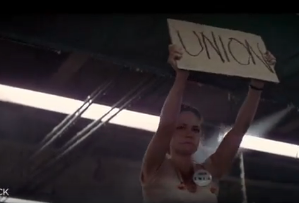The Department of Enterprise Trade and Employment announced a new ‘High-level Working Group’ through the Labour Employer Economic Forum this week. It’s time too: Ireland’s laws around collective bargaining and industrial relations are unfair. They have created some of the biggest real wage disparities in Europe. They leave now power for workers’ unions. Almost any change in Ireland’s terrible ‘voluntarist’ union recognition and collective bargaining rules would be positive.
Voluntarist approach: Ireland is an Anti-democratic Outlier
In most countries, 50% of workers plus 1 would be enough to win recognition and collective bargaining. But not in the south in Ireland. Unlike nearly anywhere in the EU, the north, Australia, the UK or even the US – government in Dublin can’t tell an employer to deal democratically with their workers through their unions. Employers can only ‘volunteer’ to ‘collectively bargain’ with workers. This ‘voluntarist’ system is supposed to make Ireland a fairer place to do business- not ‘to work’, naturally…
Outcomes: Who benefits?
The reality is that employers rarely ever sign up up to recognition agreements or collective bargaining. Unions can fight anti-democratic employers. But rules since 2015 make these fights very precarious and expensive. They remove the fight from workplace and transfer it into special courts. Bosses can pay for solicitors. Unions simply can’t do this for every workplace in need of change. It over-benefits bosses too: the rules say workers must stay busy making bosses’ profits while the solicitors’ contest goes on. It’s a terrible deal for workers. They can’t grow and educate their members through struggle like in the successful classic workplace fights we generally only see in movies now.
Their deals: Worse for workers, worse for unions, worse for all
Ireland’s frustrating union rules mean fewer visible conflicts, and fewer recruits and fewer victories. It encourages union officials to become even more conservative. Officials seem to rarely challenge anything or even significantly recruit migrant workers, young workers or workers in new industries. Significant time and effort is spent policing active members instead of recruiting and organising them. Less union organising equals fewer wins and no growth in wage power to counter the inequalities fuelling the worst changes in our society.
Real change? Bring it
Progress is welcome. The Irish Congress of Trade Unions place their hopes for a solution in the EU. Some unions want a constitutional referendum. But real progress certainly isn’t going to (voluntarily) come from Martin, Varadkar, Ryan & Co. What can we do now?
Workers bring change for workers. Fighting voices from workplace organisers need to be heard loudly, clearly, and frequently. It’s only when they are trying to constantly shut us all up that we’ll really know our voices are the ones driving change.
Let’s set the agenda we want to see as workers: end the disempowering lazy ‘partnership’ charades; start coordinated campaigns to organise the unorganised; fight for workers to build a unions that work with their members to build power for real workplace democracy. When our power is growing we’ll see much better deals being proposed. Until then, keep organising.












